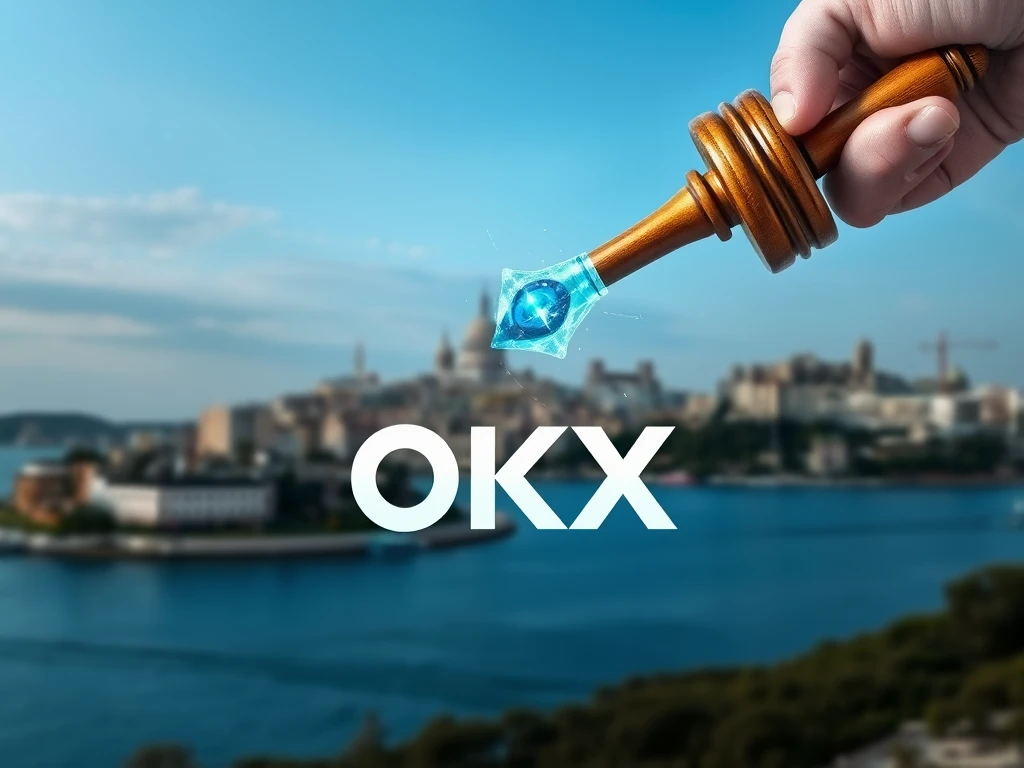Shocking $1.2M Fine: Malta Regulator Slams OKX for AML Failures

Cryptocurrency exchange OKX is facing a significant setback in its European expansion plans. The Malta Financial Intelligence Analysis Unit (FIAU) has slapped Okcoin Europe, OKX’s European arm, with a hefty €1.1 million ($1.2 million) fine. This shocking penalty stems from past failures in Anti-Money Laundering (AML) compliance, casting a shadow over the exchange’s regulatory standing despite recent improvements.
Why Did the Malta Regulator Fine OKX?
The Malta regulator, FIAU, conducted an investigation into Okcoin Europe’s operations and uncovered “systematic” AML failures dating back to 2023. Even though OKX secured a coveted MiCA license via its Malta hub in January 2025 and has reportedly boosted its compliance efforts in the last 18 months, the FIAU emphasized that past lapses could not be overlooked. The regulator stated that some of these failures were “serious and systematic,” leading to the substantial fine.
Here’s a breakdown of the key reasons for the fine:
- Past AML Deficiencies: The FIAU investigation focused on historical AML compliance issues within Okcoin Europe.
- Systematic Failures: The regulator characterized the AML failures as not isolated incidents but rather a pattern of systematic weaknesses.
- Ignoring Improvements: While acknowledging OKX’s recent efforts to enhance compliance, the FIAU maintained that past misconduct warranted punitive action.
Impact of AML Breaches on OKX’s MiCA License
OKX was among the first crypto exchanges to obtain a license under the European Union’s Markets in Crypto-Assets (MiCA) regulation through its Malta entity. This license is crucial for OKX’s ambitions to operate within the EU regulatory framework. However, this significant fine for AML breaches raises questions about the practical implications for their MiCA license. While the FIAU hasn’t explicitly revoked the license, this incident puts OKX under increased regulatory scrutiny within Europe. It serves as a stark reminder that obtaining a license is just the first step; continuous and robust compliance is paramount.
The Shadow of Money Laundering Allegations
Adding to OKX’s regulatory woes, the Malta fine comes shortly after reports of a European Union probe into the exchange concerning alleged money laundering of $100 million linked to the Bybit hack. Bybit CEO Ben Zhou publicly accused OKX of enabling hackers to launder a substantial amount of Ether (ETH) through its Web3 proxy following a $1.5 billion hack in February. These allegations, combined with the Malta fine for AML breaches, paint a concerning picture of OKX’s past compliance controls and further amplify the regulatory pressure on the exchange in Europe.
What Does This Mean for the Crypto Exchange Industry?
The OKX fine sends a powerful message to the broader cryptocurrency exchange industry. It highlights the increasing vigilance of European regulators regarding AML compliance, even for exchanges that are licensed and actively improving their systems. This action underscores the following points for the crypto industry:
- AML Compliance is Non-Negotiable: Regulators are taking AML compliance extremely seriously, and past failures will have consequences, regardless of current improvements.
- MiCA License Scrutiny: Holding a MiCA license does not provide immunity from regulatory action. Continuous compliance is essential to maintain operational legitimacy.
- Transparency and Accountability: Crypto exchanges must prioritize transparency and accountability in their operations to build trust with regulators and users alike.
Looking Ahead for OKX and Crypto Regulation
For OKX, the path forward involves demonstrating a sustained commitment to AML compliance and addressing the concerns raised by both the Malta regulator and the ongoing EU probe. This incident serves as a critical learning opportunity for the exchange and the wider crypto industry. As crypto regulation tightens globally, exchanges must proactively implement robust AML frameworks and prioritize compliance to ensure long-term sustainability and user trust. The Malta fine is a clear signal that regulators are prepared to enforce these standards rigorously, making AML compliance a top priority for all crypto businesses operating in Europe and beyond.










